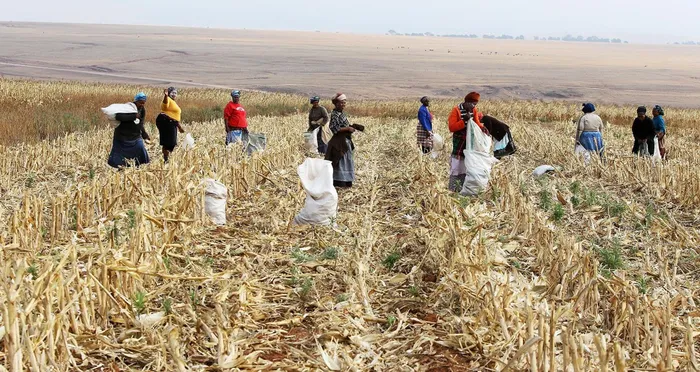South Africa's bumper grain harvest promises relief for food price inflation
AGRICULTURE

The Agricultural Business Chamber of South Africa (Agbiz) said that SA's ample grain harvest may help ease food price inflation concerns.
Image: Phando Jikelo/Independent Newspapers
The Agricultural Business Chamber of South Africa (Agbiz) has announced optimistic news for consumers as ample grain harvests are likely to ease food price inflation concerns.
Agbiz chief economist, Wandile Sihlobo, on Monday shared that South Africa's projected summer grains and oilseed production for the 2024-25 period has risen by 2% since June, reaching an expected 18.74 million tons—a significant 21% increase compared to the previous year.
Sihlobo highlighted the annual uptick across various crops, driven principally by favourable summer rains and expanded planting areas.
“There is an annual uptick in all the crops, mainly supported by favourable summer rains and the decent area plantings. This ample harvest will likely add downward pressure on prices, which bodes well for consumer food price inflation,” Sihlobo said.
However, he acknowledged that while recent increases in maize prices were influenced by the slow harvesting process and some quality issues, these were expected to be short-term and unlikely to alter the long-term outlook for prices.
“Still, the quality issues do not fundamentally change the available volume for milling acceptability and food supplies, although it may weigh on farmers' profitability,” Sihlobo said.
“We see the benefit of the solid harvest in generally softening commodity prices, now lower than last year, auguring well for consumer food price inflation.”
Upon closer examination of the data, Sihlobo revealed that maize and soybeans experienced notable upward revisions of 2% and 3%, respectively.
Conversely, sunflower seed and groundnut estimates saw declines of 3%. The maize harvest is particularly significant, now forecasted at 15.03 million tons—17% higher than the previous season—well above the country’s annual needs of roughly 12 million tons, indicating that South Africa will continue to be a net exporter of maize.
Positive trends extend to oilseeds as well, with soybean yields estimated at 2.72 million tons, reflecting a staggering 47% year-on-year increase.
Similarly, sunflower seed production is projected to rise by 12%, reaching approximately 708 300 tons. Other harvest estimates include a 41% increase in sorghum production at 137 970 tons and a 47% jump in dry beans to 74 299 tons.
According to Agbiz, the base effects and favourable agricultural conditions boosted the yields, reinforcing the idea that the country is experiencing a remarkable recovery in its grains and oilseeds output.
Despite this positive outlook, challenges remain.
Farming association TLU SA general manager, Bennie van Zyl, pointed out that grain quality issues persisted in some regions, impacting the pricing farmers can secure.
“One is the grain's quality is not of that high level and they have a quality problem. So the price that they get at the end of the day is not in certain areas and certain districts not as good as it can be. So that has an influence on those farmers,” Van Zyl said.
“Once again we mentioned that each farm is an entity in its own right and therefore it's very difficult to generalise and say that it goes well with the farmers this year because that is the reality for all of them.”
Dawie Maree, head of FNB Agriculture Marketing and Information, underlined the importance of maize as both a staple food source and a crucial input for animal feed.
“With the good supplies expected, it will have downward pressure on maize prices and hence a flow-through to possible lower food inflation,” Maree said.
BUSINESS REPORT